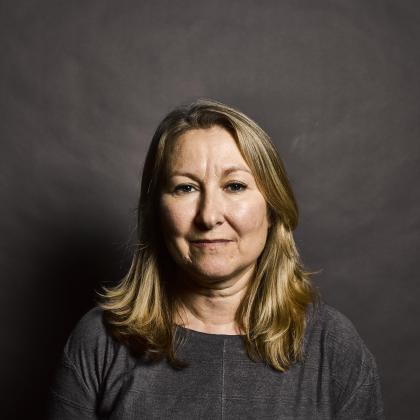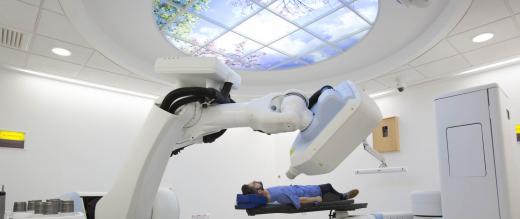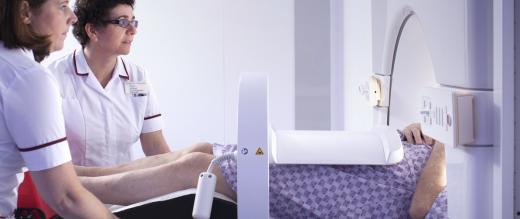
A summer to save my life
On 2 November Channel 4 aired an intimate documentary following three Royal Marsden cancer patients undergoing leading-edge immunotherapy treatment.
In A Summer to Save My Life, Tyron, Anna and Charlie were shown dealing with diagnosis, treatment and finding out if their innovative immunotherapy treatments have been successful.
The documentary captured the amazing treatment and care provided by all our staff at The Royal Marsden, and the options available to patients through the groundbreaking research we play a key role in.
Below you can find out more about these amazing patients and hear from our very own Dr James Larkin - who starred alongside Dr Nadia Yousaf and Professor Martin Gore in the documentary - explaining the benefits and possibilities of immunotherapy.
Missed the programme? Watch on All 4 catch-up.

Tyron's story
Millwall fan Tyron Hemblade, 50, from Chatham in Kent, didn't fully regain his health after a heart attack in 2012 so his doctor ordered a precautionary CT scan, which revealed renal cancer that had also spread to his lungs.
Tyron had a kidney removed but the disease progressed and was diagnosed 'terminal' in 2013. He is now on immunotherapy and the results have given something to fight for.
I wouldn’t be here if it wasn’t for The Royal Marsden- there’s no doubt about it. I was only too happy to take part in this documentary after all the years I’ve been a patient and all the help they’ve given me. Every member of staff is truly amazing.
Tyron has been married to Sam for 20 years and he says frankly that while cancer may have messed up his health it seems to have saved his marriage and he's now making amends for the mistakes of his past!

Anna's story
In April 2015 Anna Crofts, 51, from Hove in Sussex, had experienced a bout of acid reflux plus a cough that came and went. An x-ray showed enlargement of lymph nodes in the area between the lungs, which led to a CT scan and a biopsy that revealed an 'incurable' non-small cell lung cancer, adenocarcinoma. These are very rare in someone so young.
Anna underwent palliative chemo but the cancer persisted and so she decided to go on an immunotherapy trial at The Royal Marsden. It didn't work but she was put on another trial, supported by funding from The Royal Marsden Cancer Charity.
The ups and downs of being treated for cancer have also led Anna to reignite her relationship with her father. He left when she was very young and went to live in Canada. She hoped to be well enough to meet him in Rome, having seen him once in the last ten years.
It’s good to know that there are potentially other trials I can join in the future too, so I have more options when this chemo stops working. Research is advancing all the time.

Charlie's story
Charlie Davey, 25, from Canterbury in Kent, was diagnosed with melanoma when his mum noticed a small mole on his neck had changed colour. He had it removed before his 19th birthday.
Unfortunately Charlie's cancer came back on return from travelling in Australia. His neck swelled up and he needed radiotherapy and radical neck surgery to contain the melanoma. The cancer spread to the lymph nodes so he was referred to The Royal Marsden. Throughout 2015 more tumours were removed, before he was put on immunotherapy, which stabilised the cancer growth for a while. At the beginning of 2017 the cancer started growing again, so was put on immunotherapy in the spring.
I tend to live from one scan to the next, too cautious to make plans for the future. As hopeful as I am that if the immunotherapy keeps working that I’ll have a good outlook, I’m scared of getting my hopes up.
Around the time of his diagnosis, Charlie met his girlfriend Hannah. They did wonder how much time they'd have together, but they couldn't help falling in love and working towards a joint future, however uncertain.
How does immunotherapy work?
The following is taken from Channel 4's interview with Dr James Larkin:
Immunotherapy has opened up a new avenue for treating cancer which didn’t exist before. You only need to look in the waiting room - it’s hard to spot the those who are unwell in any obvious way. They’re able to go on holiday, spend time with the family. It’s something we’ve not been used to with traditional treatments. One always thinks about patients one looked after five to ten years ago who didn’t do as well, and you think what would have happened today, with access to these new treatments.
Immunotherapy doesn’t work for everybody but when it does it can work dramatically well. It's already in use with other cancers, lung cancer for example. My vision is that we’re able to fingerprint each individual tumour and, based on that, use this drug, or combination of drugs, rather than the same for everyone.
One needs to be careful with the word ‘cure’... but the indication we have so far in melanoma, where we’ve been using these drugs for 10 years, is that there is a group of people who do seem to be cured.
Bringing this vision to life
Support such as yours ensures we can continue to develop and trial personalised immunotherapy treatments for patients here at The Royal Marsden. And this means fewer side effects, a better quality of life, and the chance of a real cure for more people every day, worldwide.

